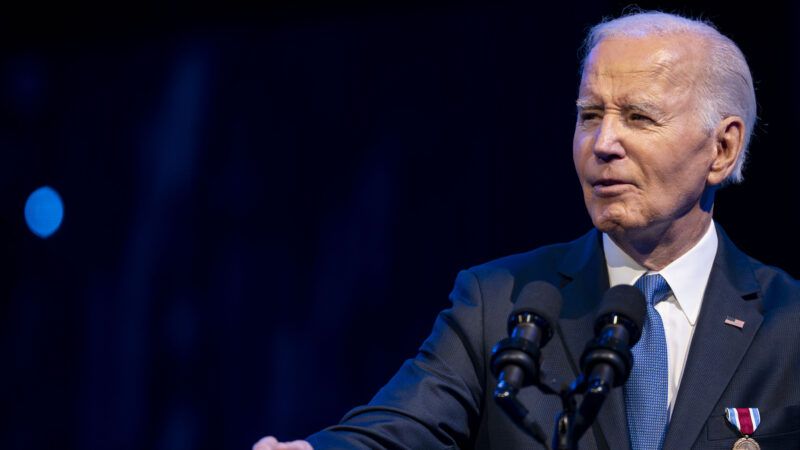Biden Has Now Issued Far More Commutations Than Any of His Predecessors
The president's record-shattering clemency actions help ameliorate the damage caused by the draconian drug policies he supported for most of his political career.

President Joe Biden today broke his own record for the most commutations issued in a single day, shortening the sentences of nearly 2,500 people who are serving time in federal prisons for nonviolent drug offenses. That brings his total commutations to more than 4,000, which far exceeds the previous record set by Barack Obama, who shortened 1,715 federal sentences as president.
Biden has granted about one-third of the commutations sought by federal prisoners since he took office, a very high rate compared to those of his recent predecessors. Obama, who received nearly three times as many commutation petitions, granted about 5 percent of them, which was high compared to the rates for Donald Trump (1 percent), George W. Bush (0.1 percent), Bill Clinton (1 percent), George H.W. Bush (0.4 percent), Ronald Reagan (1 percent), and Jimmy Carter (3 percent). Gerald Ford's rate (4 percent) was close to Obama's, while Richard Nixon's rate (nearly 7 percent) was higher, but both of those presidents received far fewer petitions.
Biden's latest batch of commutations, which follows about 1,500 he issued on December 12 for prisoners who had been transferred to home confinement during the COVID-19 pandemic, focuses on people who are serving drug sentences that are probably longer than they would have received under current law. "Today's clemency action provides relief for individuals who received lengthy sentences based on discredited distinctions between crack and powder cocaine, as well as outdated sentencing enhancements for drug crimes," Biden said. "This action is an important step toward righting historic wrongs, correcting sentencing disparities, and providing deserving individuals the opportunity to return to their families and communities after spending far too much time behind bars."
Although Biden did not mention it, those "sentencing disparities" and "historic wrongs" are the result of insanely punitive drug laws that he enthusiastically supported during his 36 years in the U.S. Senate. The New York Times alludes to that history, but in a way that understates Biden's role in establishing the harsh penalties he now regrets.
During the last two decades, the Times says, Congress "has passed legislation to remedy decades-long disparities spurred by tough-on-crime laws, such as mandatory minimum sentences. As a senator, Mr. Biden championed one such law, the 1994 crime bill. He has since expressed regret for his support of the legislation, and he committed during the 2020 campaign to addressing the long drug sentences that resulted."
Biden was still bragging about that 1994 law—the incarceration-expanding Violent Crime Control and Law Enforcement Act (or, as he proudly called it, "the 1994 Biden Crime Bill")—as late as 2015. And contrary to the impression left by the Times, it was just one in a long series of "tough-on-crime laws" that he supported, which included the Comprehensive Crime Control Act of 1984, the Anti–Drug Abuse Act of 1986, the Anti-Drug Abuse Act of 1988, the 1994 crime bill, the Illicit Drug Anti-Proliferation Act of 2003, and the Combat Methamphetamine Epidemic Act of 2005.
Those laws established the harsh sentences that Biden now views as "a big mistake," including a sentencing scheme that irrationally treated smoked cocaine as if it were 100 times worse than the snorted kind and prescribed a five-year mandatory minimum sentence for crack users caught with as little as five grams. As vice president in 2012, Biden was still citing his work with Sen. Strom Thurmond (R–S.C.) on the 1984 crime bill, which started the ball rolling on mandatory minimums, as an inspiring example of bipartisan collaboration.
Sen. Cory Booker (D–N.J.) rebuked Biden for that record during a 2019 Democratic presidential debate. "There are people right now in prison for life for drug offenses because you stood up and used that 'tough on crime' phony rhetoric that got a lot of people elected but destroyed communities like mine," Booker said.
During that same presidential campaign, a chastened Biden promised to "eliminate mandatory minimums"; "end, once and for all, the federal crack and powder cocaine disparity"; "decriminalize the use of cannabis," and "automatically expunge all prior cannabis use convictions." All of those things would have required new legislation, and none of them actually happened. But Biden also promised he would "use the president's clemency power to secure the release of individuals facing unduly long sentences for certain non-violent and drug crimes." And he has done that in an unprecedented way, helping to ameliorate the damage caused by the draconian policies he supported for most of his political career.


Show Comments (22)